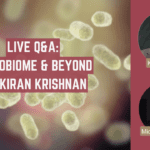
Play Video
Enzyme Series 1: Protease Enzyme
Welcome to another Rebel Health Tribe video where we are going to talk about enzymes – Protease Enzyme to be specific.
More videos in this series –
Enzyme Series 1: Protease Enzyme
Enzyme Series 2: Bromelain Enzyme
Enzyme Series 3: Nattokinase Enzyme
Enzyme Series 4: Peptidase Enzyme
Enzyme Series 5: Seaprose Enzyme
Enzyme Series 6: Pepain Enzyme
Enzyme Series 7: Pancreatin Enzyme
Enzyme Series 8: Trypsin Enzyme
Enzyme Series 9: Serrapeptase Enzyme
Enzyme Series 10: Superoxide Dismutase
Enzyme Series 11: Amylase Enzyme
Enzyme Series 12: Lipase Enzyme
To learn more about enzymes and Fibrenza check out this webinar – Deep Dive Into Systemic Enzymes | Catalysts of Health & Vitality

SHARE THIS EPISODE
Recent Videos
Webinar Transcript
Michael:
Hey everyone. Welcome to another Rebel Health Tribe interview where we are going to talk about enzymes – protease first. We are joined by microbiologist Kiran . Kiran, how’s it going?
Kiran :
Great. How are you guys?
Michael:
Awesome. I feel like we do this all the time, probably because we do this all the time. Today some of you might know Kiran as our guest expert on the microbiome series, which is awesome. If you haven’t watched that, I would highly recommend checking out those webinars. They’re available in the free member area in My Dashboard area if you’re going to go look for that, but all the replays are there. It’s like 15 hours now of crazy microbiome information. Today though we’re going to talk about a little bit different of a subject. That is proteolytic or systemic enzymes. Can you explain what that means a little bit?
What is proteolytic or systemic enzymes?
Kiran:
Yeah, so the word proteolytic means that it breaks down proteins in a variety of ways. Every proteolytic enzyme has a different target within the protein structure itself, and so it creates a different product once it cuts up the protein. Systemic enzyme is one that has the capability of being absorbed into the body and then perform functions throughout the body. Digestive enzymes, for example, work primarily in the digestive tract and don’t really do a whole lot in the rest of the body. Systemic enzymes do somehow get through.
There’s some overlap; there’s some digestive enzymes that seem to have systemic effect as well, so we’ll talk a little bit about each of those.
Michael:
What would determine if they have an effect as a digestive enzyme or as a systemic? Would you take it with or without food?
Kiran:
If it’s known systemic enzyme then you want to take it without food to encourage the absorption because if there’s any food present in the gut then the enzyme will start going to work to actually break down the food itself, but if it’s a digestive enzyme, obviously you want to take it with food. The ones that double as both systemic and proteolytic, like Pancreatin for example, if you have pancreatic insufficiency, you might need to take it with food and a dose without food as well, so you have both the benefits.
Michael:
That makes sense. I’m going to go down a list of commonly used proteolytic or systemic enzymes and other ingredients you might find in a product that contains proteolytic and systemic enzymes, and we can just go through each one. Some will just be short. Some a little bit more info on what they do, what the functions are, why someone might want to take it or what the benefit might be, and if there’s any specific they’d want to look for regarding that specific enzyme.
First off, we have protease. This is one that you’ll likely see in digestive or systemic enzymes, correct?
Kiran:
Yeah, and if it just says protease or acid stable protease, that means it’s kind of a generic protein-digesting enzyme. It more than likely will be more beneficial for breaking down food because most of the well-known systemic enzymes have been branded or have names that are more specific to what they do in the body, so protease just means an enzyme that breaks down proteins. Having a variety of proteases in important, so people need to understand that protease doesn’t mean it breaks down protein in the same spot, so every protease enzyme has a different place within the amino chain that it actually cuts the amino acid, and so in many cases, you need a series of protease enzymes to break down a full big piece of protein into its original amino acids that you need to then absorb and utilize.
First, you need a protease that cuts it into bigger pieces, then you need another protease that cuts those bigger pieces into little, little pieces, and finally, the peptidases break it down into tiny peptides and release the amino acids.
Michael:
That makes sense, so protease is more of a general term of an enzyme that breaks down protein versus a specific enzyme.
Kiran:
Exactly. Protease is just an all-encompassing term. Most of the systemic enzymes we’ll talk about fall under the category of protease, so just the word protease just means a protein-digesting enzyme.
Michael:
Perfect. Thank you.

Kiran Krishnan, Microbiologist
About our Guest
Kiran Krishnan is a Research Microbiologist and has been involved in the dietary supplement and nutrition market for the past 17 years. He comes from a strict research background having spent several years with hands-on R&D in the fields of molecular medicine and microbiology at the University of Iowa. He left University research to take a position as the U.S. Business Development and Product Development lead for Amano Enzyme, USA. Amano is one of the world’s largest suppliers of therapeutic enzymes used in the dietary supplement and pharmaceutical industries in North America. Kiran also established a Clinical Research Organization where he designed and conducted dozens of human clinical trials in human nutrition.
Kiran is also a co-founder and partner in Nu Science Trading, LLC.; a nutritional technology development, research and marketing company in the U.S. Dietary Supplement and Medical Food markets. Most recently, Kiran is acting as the Chief Scientific Officer at Physician’s Exclusive, LLC. and Microbiome Labs. He has developed over 50 private label nutritional products for small to large brands in the global market. He is a frequent lecturer on the Human Microbiome at Medical and Nutrition Conferences. He conducts the popular monthly Microbiome Series Webinars through the Rebel Health Tribe Group practitioner training program, is an expert guest on National Radio and Satellite radio and has been a guest speaker on several Health Summits as a microbiome expert. He is currently involved in 9 novel human clinical trials on probiotics and the human microbiome.
Kiran is also on the Scientific Advisory Board for 5 other companies in the industry. Kiran offers his extensive knowledge and practical application of the latest science on the human microbiome as it relates to health and wellness.






